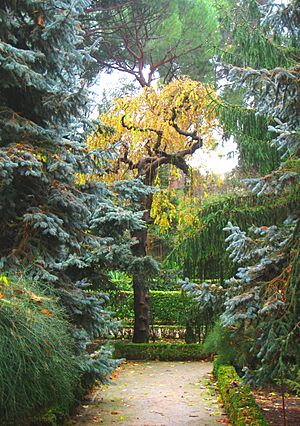Jardín histórico facts for kids
A Jardín histórico is a special kind of historic garden in Spain. It's like a protected status for beautiful old gardens. This protection helps make sure these gardens stay safe and beautiful for everyone to enjoy.
Spain started protecting these gardens in 1983. Before that, they had a similar protection called Jardín artístico. Today, the Spanish government's Ministry of Education, Culture and Sport looks after these important gardens.

Sometimes, famous places in Spain have more than one type of protection. For example, the amazing Alhambra and Generalife are protected as both important buildings and historic gardens.
Even single trees can be protected in Spain! This is called Árbol singular status. It's like a special order to protect important trees. For instance, a very old taxodium mucronatum tree in Buen Retiro Park is an Árbol singular. You can see it and other special trees on a walking path in the park.
What is a Bien de Interés Cultural?
A Jardín histórico is part of a bigger group called Bien de Interés Cultural. This Spanish term means "Property of Cultural Interest." It's a very important way Spain protects all kinds of cultural heritage.
Besides historic gardens, the Bien de Interés Cultural group also protects other non-moving heritage. These include:
- Conjunto histórico: This is a type of protected area, like a historic neighborhood. It might include one or more important buildings.
- Monumento: This protects single important buildings or structures.
- Sitio histórico: This protects historic sites, like where important events happened. An example is the Bulls of Guisando.
- Zona arqueológica: This protects archaeological zones, which are places where ancient remains are found. The Archaeological Site of Atapuerca is a famous example.
See also
- Spanish garden
 In Spanish: Jardín histórico para niños
In Spanish: Jardín histórico para niños
 | Delilah Pierce |
 | Gordon Parks |
 | Augusta Savage |
 | Charles Ethan Porter |

